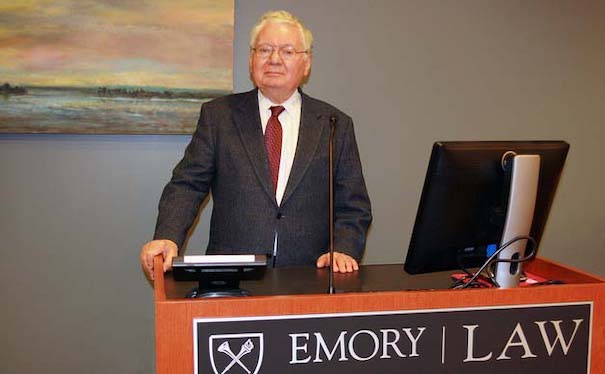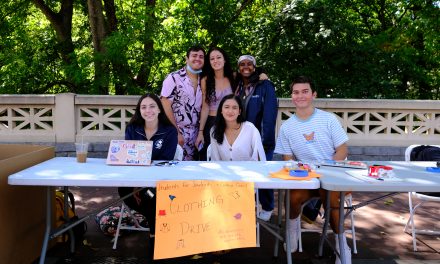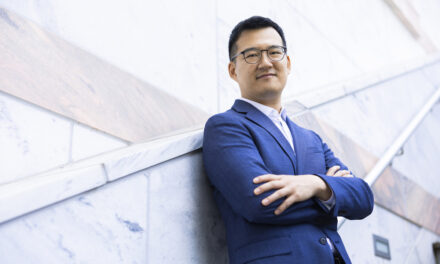The Honorable Thomas Buergenthal — a leader in human rights law who worked at Emory University School of Law in the 1980s — died on May 29 at 89 years old in Miami. He is survived by his wife, Marjorie; three sons, Alan, Robert and John; two stepchildren, Cristina De las Casas and Sebastian Dibos; and nine grandchildren.
Buergenthal led an esteemed career as an international law and human rights law scholar, lawyer and judge. He was awarded the Manley O. Hudson Medal of the American Society of International Law, the Gruber Foundation International Justice Prize and the Goler T. Butcher Medal for Excellence in Human Rights.
Born in 1934 in Lubochna, Slovakia, Buergenthal grew up under the Nazi regime for the first 11 years of his life. He grew up in the Jewish World War II Kielce Ghetto in Poland. Buergenthal and his family spent about two years in a forced-labor camp after Kielce was liquidated in 1942.
Buergenthal and his parents were then deported to Auschwitz, a concentration camp in Poland, in 1944. In 1945, the Nazis made Buergenthal embark on a death march from Auschwitz before sending him to Sachsenhausen, a concentration camp in Germany. A few months later, Soviet troops liberated Sachsenhausen in April 1945. Buergenthal was one of the youngest Holocaust survivors from Auschwitz and Sachsenhausen. Buergenthal’s father and grandparents died in the Holocaust.
After liberation, Buergenthal lived in an orphanage before reuniting with his mother in Gottingen, Germany. He immigrated to the United States in 1951 at 17 years old to live with aunt, uncle and cousin.
In his 2007 book “A Lucky Child: A Memoir of Surviving Auschwitz as a Young Boy,” Buergethal wrote that surviving the Holocaust pushed him “to be a better human rights lawyer” because he understood “not only intellectually but also emotionally, what it is like to be a victim of human rights violations.”
A mere six years after moving to the U.S., Buergenthal received his undergraduate degree from Bethany College (W.Va.) in 1957. He then attended New York University School of Law, where he graduated in 1960. He later earned a Master of Laws degree and a Doctor of Juridical Science degree in international law from Harvard Law School (Mass.).
Charles Howard Candler Professor of Law Morgan Cloud worked closely with Buergenthal during his time at Emory. Cloud described the judge as a close friend and said that Buergenthal’s life experiences pushed him to make a difference through human rights law.
“The thing that was so striking about Tom was that he lived through these horrific experiences [as] a child and he came out of that nightmare not bitter, but as a gentle and kind man who dedicated his life not to revenge or anger but to building a world where these things couldn’t happen,” Cloud said.

The Honorable Thomas Buergenthal stands at a podium at Emory University School of Law. Courtesy of Emory University
Sean Murphy, the Manatt/Ahn Professor of International Law at The George Washington University (GWU) Law School (D.C.), expressed similar sentiments after working alongside Buergenthal at GWU. He said that Buergenthal was a “remarkable” and “humble” individual with an “extremely bright” mind that he used for good.
“For many people, I would imagine, who suffered through the Holocaust and saw those horrors, it would be perhaps easier to try to turn away from these sorts of things and not try to relive the experience by studying and trying to end atrocities occurring elsewhere,” Murphy said. “But Tom was the opposite. He very much wanted to commit himself to the field of human rights.”
Outside of his education, Buergenthal received numerous honorary degrees from schools in the U.S. and Europe, including the Free University of Brussels in Belgium, Heidelberg University in Germany and the University of Minnesota.
“Pretty much anyone who came into contact with him had to feel inspired by who he was and what he was trying to do,” Murphy said.
Before coming to the Emory University School of Law, Buergenthal was a professor at the University at Buffalo School of Law (N.Y.) and the University of Texas at Austin. He was then appointed dean of American University Washington College of Law (D.C.) in 1980. He held the position from 1980 to 1985.
At Emory, Buergenthal served as the inaugural I.T. Cohen Professor of International Law and Human Rights at the Emory School of Law from 1985 to 1989. The most recent person to hold this title was Johan D. van der Vyver, who died on May 22.
“He elevated, let’s say, [the I.T. Cohen professorship’s] name and into being the professorship for human rights and international law,” said Emory School of Law Distinguished Professor Emeritus Peter Hay.
During his tenure at Emory, Buergenthal also directed the Carter Center’s Human Rights Program from 1986 to 1989.
Additionally, Buergenthal served as president of the Inter-American Court of Human Rights from 1985 to 1987, making him the only American to hold this position since the court was established in 1979. Buergenthal later went on to be the only American to act as a judge for the court.
“He helped make that court what it is today, which is a very robust court of human rights, developing some of the most important early jurisprudence of the court that continues to guide it today,” Murphy said.
Following his time at Emory, Buergenthal was the Lobingier Professor of Comparative Law and Jurisprudence at GWU Law School from 1989 to 2000. During this time, Buergenthal was also influential in international law, serving as a judge on the Inter-American Development Bank‘s Administrative Tribunal, participating in the United Nations (U.N.) Truth Commission for El Salvador and sitting on the U.N. Human Rights Committee.
Buergenthal ultimately departed GWU to serve on the principal judicial body of the U.N., the International Court of Justice. He later returned to GWU in 2010, where he was a professor until he retired in 2015.
While at GWU, Murphy said Buergenthal was active in fact finding missions related to right-wing governments committing “horrible abuses” in South America and Central America. Buergenthal traveled to Latin America to interview people who faced these human rights “atrocities” and developed reports in an attempt to hold governments accountable, according to Murphy.
Murphy said that Buergenthal was very inspiring to his students, conducting himself with a quiet demeanor full of authority and experience.
“Tom often said that he felt he could tell in his bones what it was like for people who are suffering human rights abuses because he had been himself,” Murphy said. “When he would talk to students about the need for human rights, the need for human rights institutions, it wasn’t just an abstract scholarly discourse, it was based on his own past experiences.”
Additionally, he served as honorary president of the American Society of International Law from 2002 to 2009.
“He was a world-wide known person,” Hay said. “Great reputation.”
Cloud said that while Buergenthal is known for the impact he made through his work, he remembers the judge for the friend and person he was outside of the courtroom — a man with a joyful laugh that he often shared with others. Cloud recalled that he ran into Buergenthal and his wife at the local Blockbuster several times, where they always rented comedies.
“To live the life he lived and come out with that capacity for joy and laughter always struck me as remarkable,” Cloud said.
Murphy remembered him similarly, recalling that Buergenthal came over to his house for dinner one evening, where they had a deep conversation about the International Criminal Court around the dining table.
At this dinner, one of Murphy’s young children stumbled into the room and asked the adults if anyone wanted to play ping pong. Buergenthal immediately jumped up and left the conversation to go play, according to Murphy. Despite losing two toes to frostbite during a death march leaving the Auschwitz concentration camp, Murphy said Buergenthal proved himself as a decent player.
“I just look at an evening like that, and it kind of says something about who he was — somebody who was extremely bright and committed to the field of international law, but who also now withstanding the difficulties he had gone through, some of which were physical in nature,” Murphy said. “He wanted to enjoy life, and he wanted to experience life. And that’s what he did.”







